In-depth Report on Hospitality Provision in Travel & Tourism Sector
VerifiedAdded on 2024/07/01
|19
|4514
|66
Report
AI Summary
This report, prepared from the perspective of a Junior Consultant at PKF Hotelexperts, examines the critical role of the hospitality industry within the broader travel and tourism sector. It begins by detailing the interrelationships between hospitality and tourism, highlighting the importance of business travel, aviation, and visitor attractions. The report then analyzes the implications of vertical and horizontal integration within the hospitality industry, focusing on branding policies, pricing strategies, market control, and globalization. It further discusses the effects of integration on hospitality businesses, including the decline of independent businesses, increased market share for larger organizations, improved quality of services, and economies of scale. The report also touches upon the three main stages of developing any hospitality project. This document is available on Desklib, a platform offering a wealth of study resources for students.
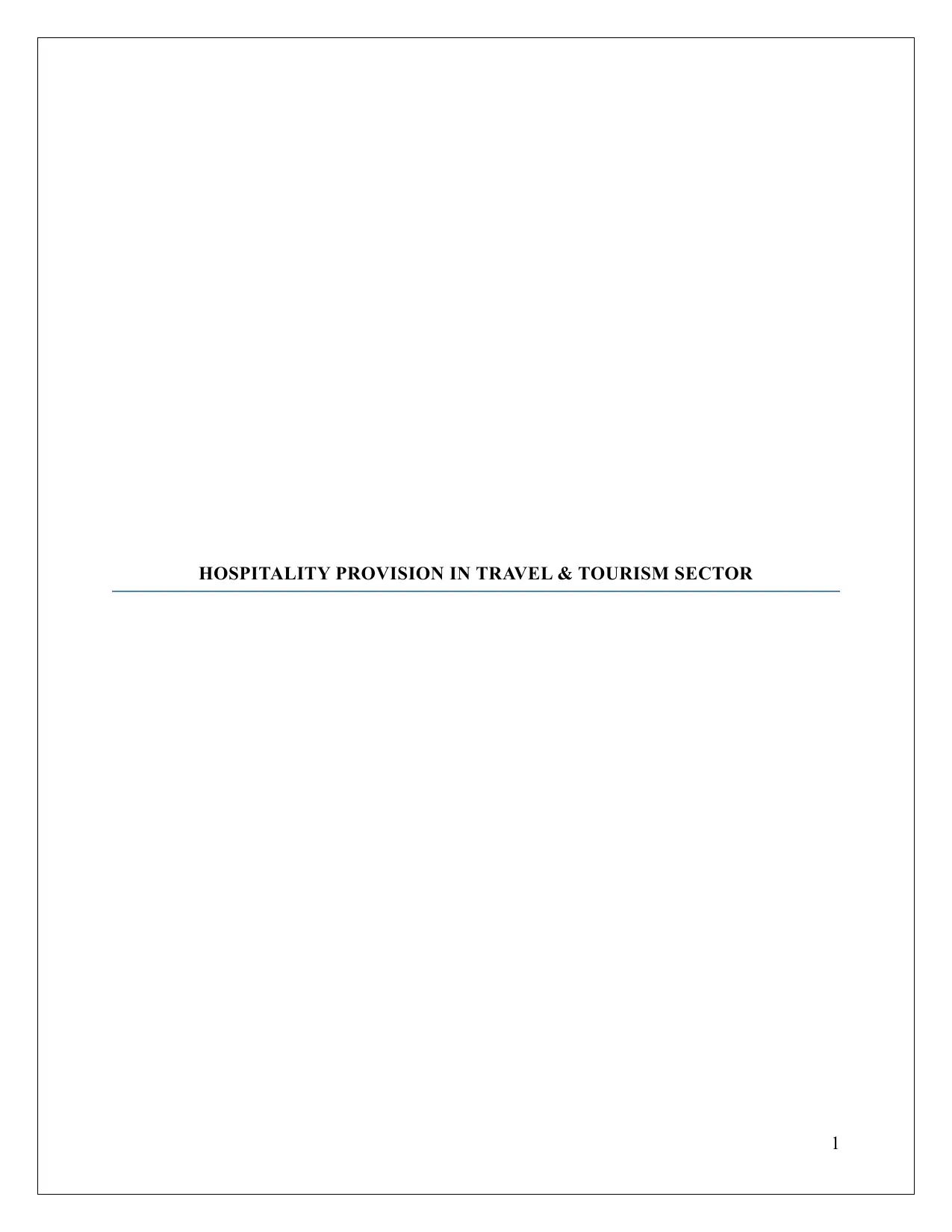
HOSPITALITY PROVISION IN TRAVEL & TOURISM SECTOR
1
1
Paraphrase This Document
Need a fresh take? Get an instant paraphrase of this document with our AI Paraphraser
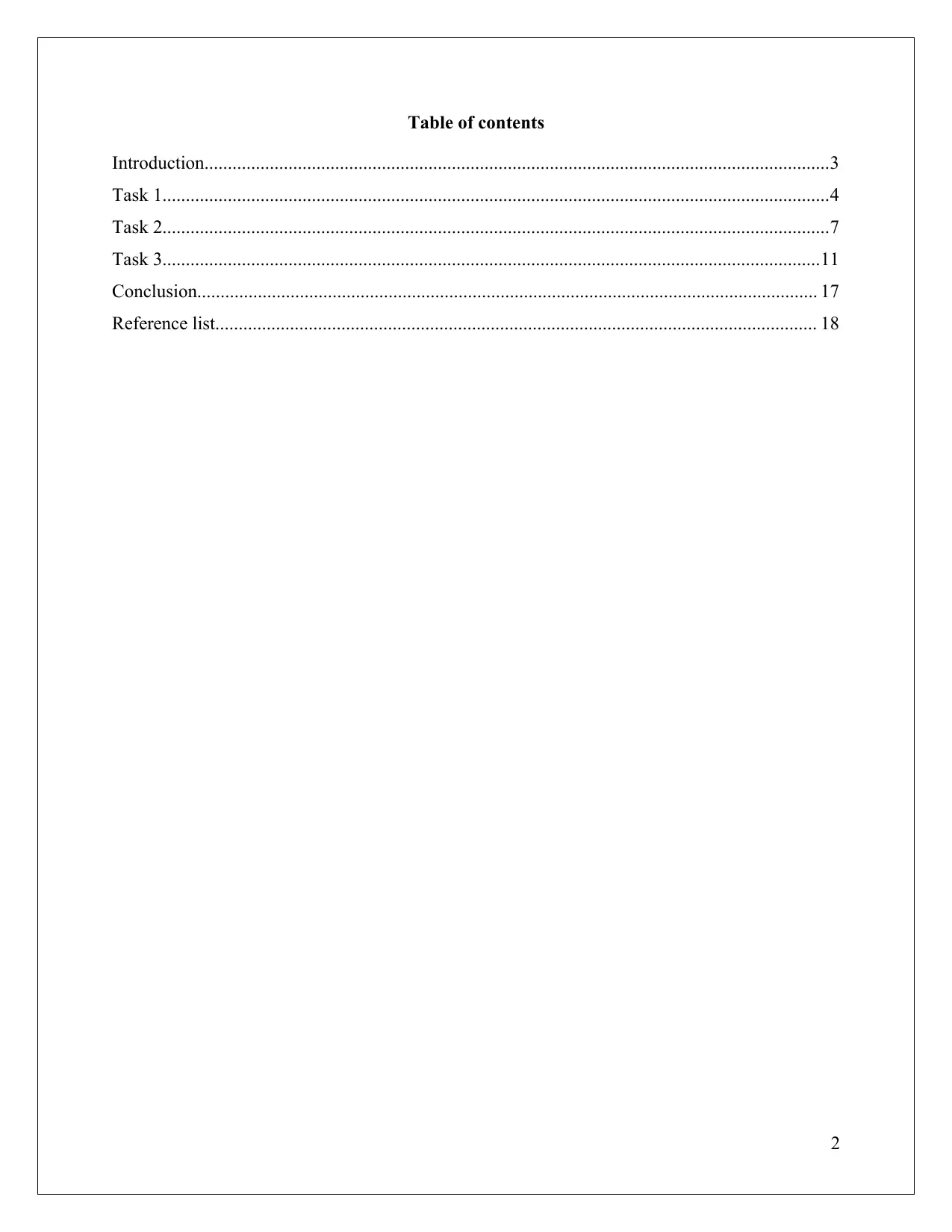
Table of contents
Introduction......................................................................................................................................3
Task 1...............................................................................................................................................4
Task 2...............................................................................................................................................7
Task 3.............................................................................................................................................11
Conclusion..................................................................................................................................... 17
Reference list................................................................................................................................. 18
2
Introduction......................................................................................................................................3
Task 1...............................................................................................................................................4
Task 2...............................................................................................................................................7
Task 3.............................................................................................................................................11
Conclusion..................................................................................................................................... 17
Reference list................................................................................................................................. 18
2
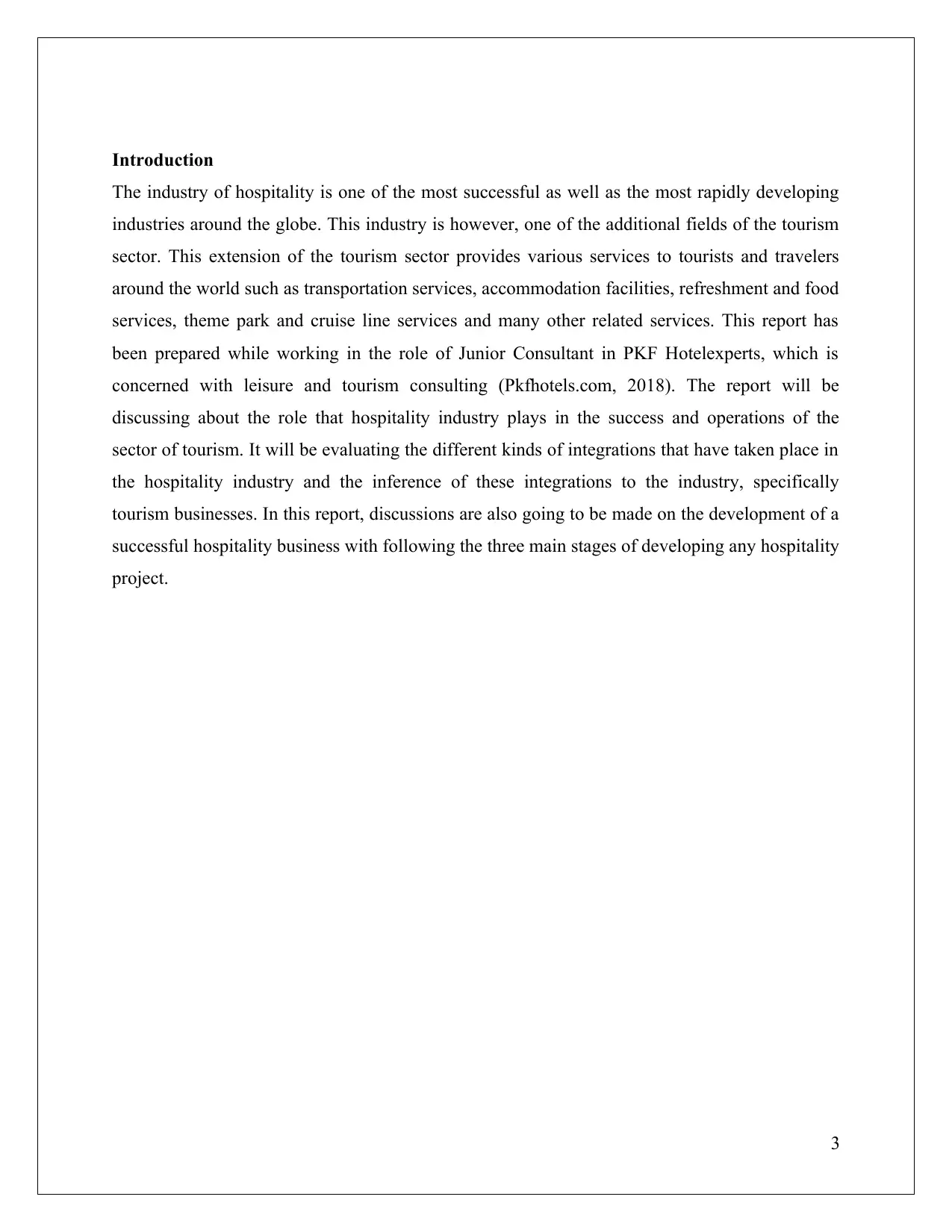
Introduction
The industry of hospitality is one of the most successful as well as the most rapidly developing
industries around the globe. This industry is however, one of the additional fields of the tourism
sector. This extension of the tourism sector provides various services to tourists and travelers
around the world such as transportation services, accommodation facilities, refreshment and food
services, theme park and cruise line services and many other related services. This report has
been prepared while working in the role of Junior Consultant in PKF Hotelexperts, which is
concerned with leisure and tourism consulting (Pkfhotels.com, 2018). The report will be
discussing about the role that hospitality industry plays in the success and operations of the
sector of tourism. It will be evaluating the different kinds of integrations that have taken place in
the hospitality industry and the inference of these integrations to the industry, specifically
tourism businesses. In this report, discussions are also going to be made on the development of a
successful hospitality business with following the three main stages of developing any hospitality
project.
3
The industry of hospitality is one of the most successful as well as the most rapidly developing
industries around the globe. This industry is however, one of the additional fields of the tourism
sector. This extension of the tourism sector provides various services to tourists and travelers
around the world such as transportation services, accommodation facilities, refreshment and food
services, theme park and cruise line services and many other related services. This report has
been prepared while working in the role of Junior Consultant in PKF Hotelexperts, which is
concerned with leisure and tourism consulting (Pkfhotels.com, 2018). The report will be
discussing about the role that hospitality industry plays in the success and operations of the
sector of tourism. It will be evaluating the different kinds of integrations that have taken place in
the hospitality industry and the inference of these integrations to the industry, specifically
tourism businesses. In this report, discussions are also going to be made on the development of a
successful hospitality business with following the three main stages of developing any hospitality
project.
3
⊘ This is a preview!⊘
Do you want full access?
Subscribe today to unlock all pages.

Trusted by 1+ million students worldwide
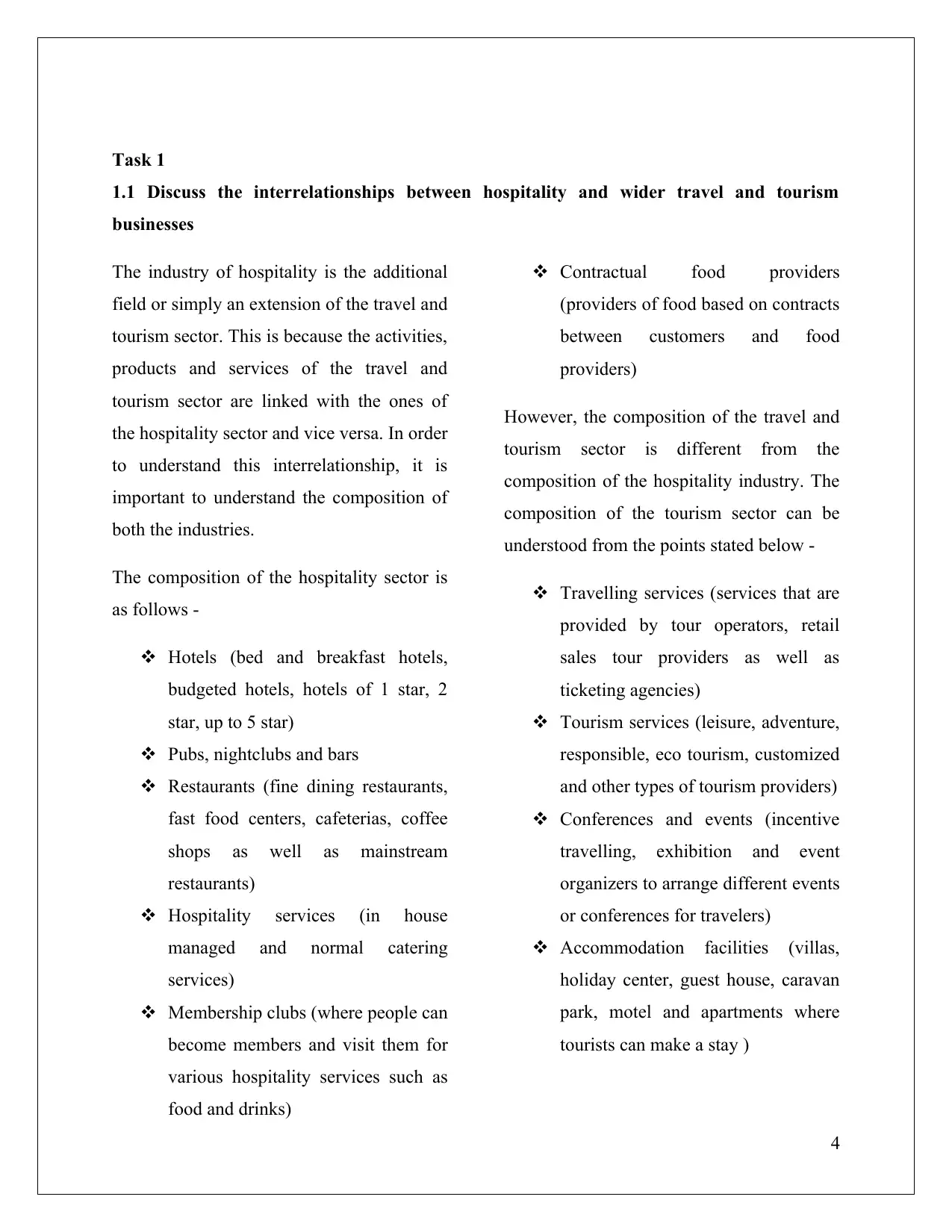
Task 1
1.1 Discuss the interrelationships between hospitality and wider travel and tourism
businesses
The industry of hospitality is the additional
field or simply an extension of the travel and
tourism sector. This is because the activities,
products and services of the travel and
tourism sector are linked with the ones of
the hospitality sector and vice versa. In order
to understand this interrelationship, it is
important to understand the composition of
both the industries.
The composition of the hospitality sector is
as follows -
Hotels (bed and breakfast hotels,
budgeted hotels, hotels of 1 star, 2
star, up to 5 star)
Pubs, nightclubs and bars
Restaurants (fine dining restaurants,
fast food centers, cafeterias, coffee
shops as well as mainstream
restaurants)
Hospitality services (in house
managed and normal catering
services)
Membership clubs (where people can
become members and visit them for
various hospitality services such as
food and drinks)
Contractual food providers
(providers of food based on contracts
between customers and food
providers)
However, the composition of the travel and
tourism sector is different from the
composition of the hospitality industry. The
composition of the tourism sector can be
understood from the points stated below -
Travelling services (services that are
provided by tour operators, retail
sales tour providers as well as
ticketing agencies)
Tourism services (leisure, adventure,
responsible, eco tourism, customized
and other types of tourism providers)
Conferences and events (incentive
travelling, exhibition and event
organizers to arrange different events
or conferences for travelers)
Accommodation facilities (villas,
holiday center, guest house, caravan
park, motel and apartments where
tourists can make a stay )
4
1.1 Discuss the interrelationships between hospitality and wider travel and tourism
businesses
The industry of hospitality is the additional
field or simply an extension of the travel and
tourism sector. This is because the activities,
products and services of the travel and
tourism sector are linked with the ones of
the hospitality sector and vice versa. In order
to understand this interrelationship, it is
important to understand the composition of
both the industries.
The composition of the hospitality sector is
as follows -
Hotels (bed and breakfast hotels,
budgeted hotels, hotels of 1 star, 2
star, up to 5 star)
Pubs, nightclubs and bars
Restaurants (fine dining restaurants,
fast food centers, cafeterias, coffee
shops as well as mainstream
restaurants)
Hospitality services (in house
managed and normal catering
services)
Membership clubs (where people can
become members and visit them for
various hospitality services such as
food and drinks)
Contractual food providers
(providers of food based on contracts
between customers and food
providers)
However, the composition of the travel and
tourism sector is different from the
composition of the hospitality industry. The
composition of the tourism sector can be
understood from the points stated below -
Travelling services (services that are
provided by tour operators, retail
sales tour providers as well as
ticketing agencies)
Tourism services (leisure, adventure,
responsible, eco tourism, customized
and other types of tourism providers)
Conferences and events (incentive
travelling, exhibition and event
organizers to arrange different events
or conferences for travelers)
Accommodation facilities (villas,
holiday center, guest house, caravan
park, motel and apartments where
tourists can make a stay )
4
Paraphrase This Document
Need a fresh take? Get an instant paraphrase of this document with our AI Paraphraser
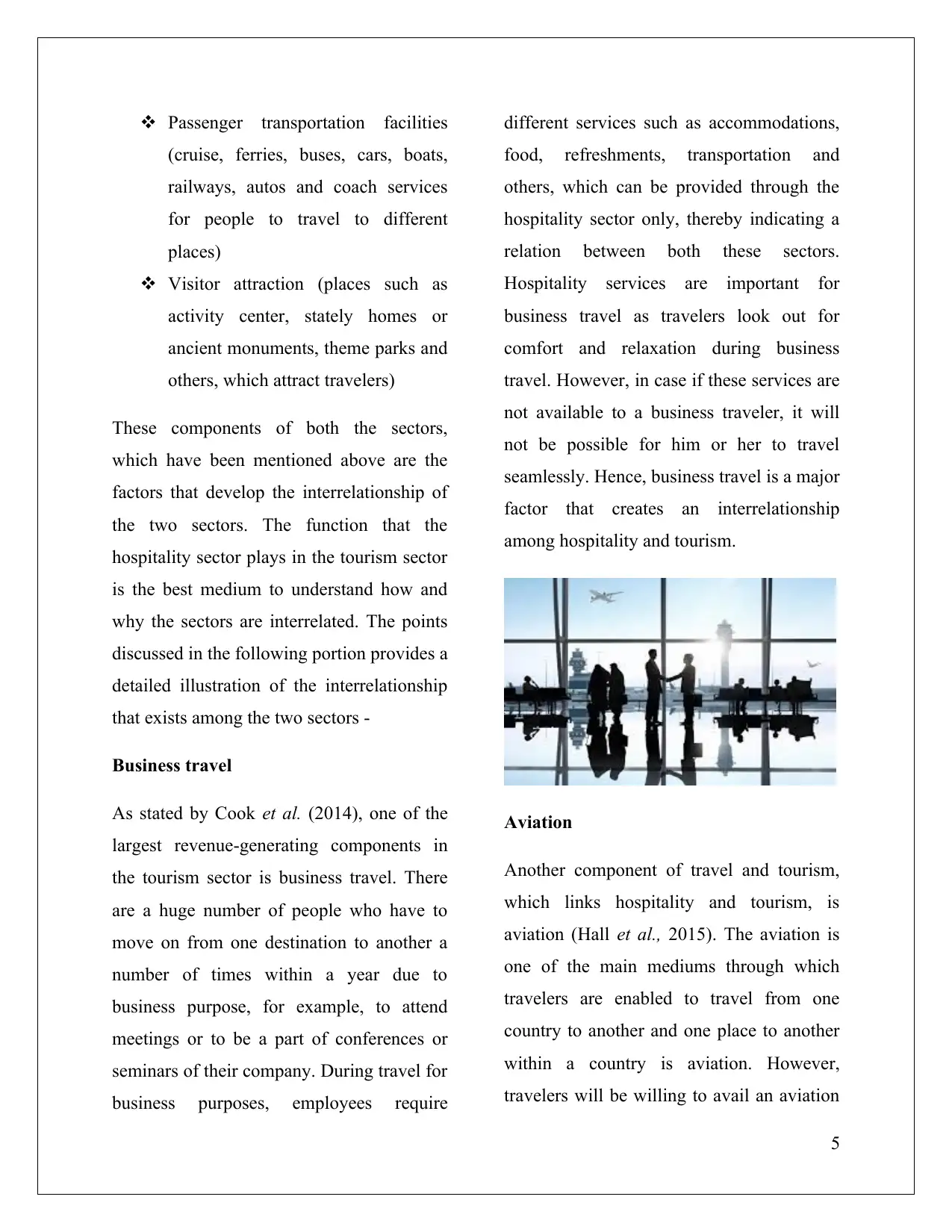
Passenger transportation facilities
(cruise, ferries, buses, cars, boats,
railways, autos and coach services
for people to travel to different
places)
Visitor attraction (places such as
activity center, stately homes or
ancient monuments, theme parks and
others, which attract travelers)
These components of both the sectors,
which have been mentioned above are the
factors that develop the interrelationship of
the two sectors. The function that the
hospitality sector plays in the tourism sector
is the best medium to understand how and
why the sectors are interrelated. The points
discussed in the following portion provides a
detailed illustration of the interrelationship
that exists among the two sectors -
Business travel
As stated by Cook et al. (2014), one of the
largest revenue-generating components in
the tourism sector is business travel. There
are a huge number of people who have to
move on from one destination to another a
number of times within a year due to
business purpose, for example, to attend
meetings or to be a part of conferences or
seminars of their company. During travel for
business purposes, employees require
different services such as accommodations,
food, refreshments, transportation and
others, which can be provided through the
hospitality sector only, thereby indicating a
relation between both these sectors.
Hospitality services are important for
business travel as travelers look out for
comfort and relaxation during business
travel. However, in case if these services are
not available to a business traveler, it will
not be possible for him or her to travel
seamlessly. Hence, business travel is a major
factor that creates an interrelationship
among hospitality and tourism.
Aviation
Another component of travel and tourism,
which links hospitality and tourism, is
aviation (Hall et al., 2015). The aviation is
one of the main mediums through which
travelers are enabled to travel from one
country to another and one place to another
within a country is aviation. However,
travelers will be willing to avail an aviation
5
(cruise, ferries, buses, cars, boats,
railways, autos and coach services
for people to travel to different
places)
Visitor attraction (places such as
activity center, stately homes or
ancient monuments, theme parks and
others, which attract travelers)
These components of both the sectors,
which have been mentioned above are the
factors that develop the interrelationship of
the two sectors. The function that the
hospitality sector plays in the tourism sector
is the best medium to understand how and
why the sectors are interrelated. The points
discussed in the following portion provides a
detailed illustration of the interrelationship
that exists among the two sectors -
Business travel
As stated by Cook et al. (2014), one of the
largest revenue-generating components in
the tourism sector is business travel. There
are a huge number of people who have to
move on from one destination to another a
number of times within a year due to
business purpose, for example, to attend
meetings or to be a part of conferences or
seminars of their company. During travel for
business purposes, employees require
different services such as accommodations,
food, refreshments, transportation and
others, which can be provided through the
hospitality sector only, thereby indicating a
relation between both these sectors.
Hospitality services are important for
business travel as travelers look out for
comfort and relaxation during business
travel. However, in case if these services are
not available to a business traveler, it will
not be possible for him or her to travel
seamlessly. Hence, business travel is a major
factor that creates an interrelationship
among hospitality and tourism.
Aviation
Another component of travel and tourism,
which links hospitality and tourism, is
aviation (Hall et al., 2015). The aviation is
one of the main mediums through which
travelers are enabled to travel from one
country to another and one place to another
within a country is aviation. However,
travelers will be willing to avail an aviation
5
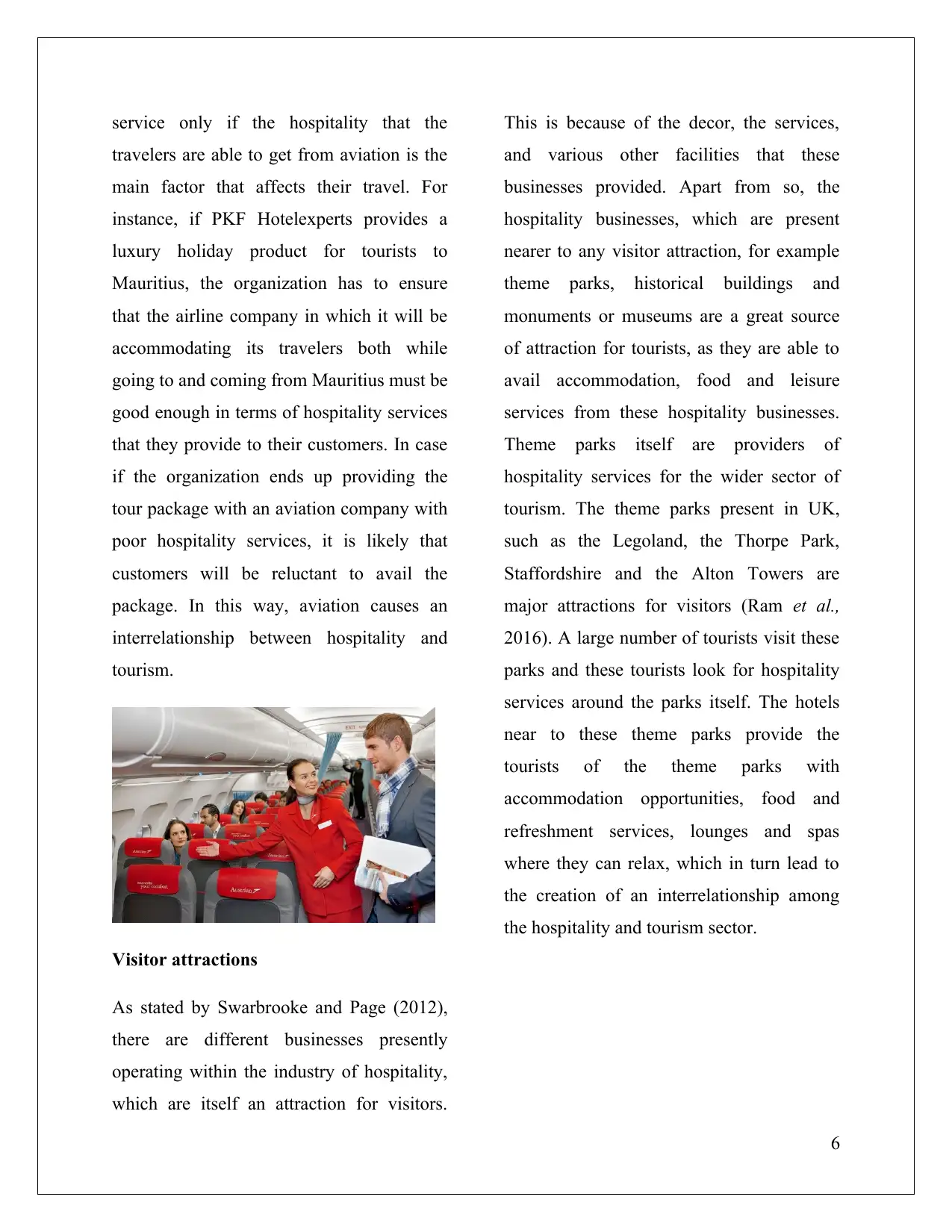
service only if the hospitality that the
travelers are able to get from aviation is the
main factor that affects their travel. For
instance, if PKF Hotelexperts provides a
luxury holiday product for tourists to
Mauritius, the organization has to ensure
that the airline company in which it will be
accommodating its travelers both while
going to and coming from Mauritius must be
good enough in terms of hospitality services
that they provide to their customers. In case
if the organization ends up providing the
tour package with an aviation company with
poor hospitality services, it is likely that
customers will be reluctant to avail the
package. In this way, aviation causes an
interrelationship between hospitality and
tourism.
Visitor attractions
As stated by Swarbrooke and Page (2012),
there are different businesses presently
operating within the industry of hospitality,
which are itself an attraction for visitors.
This is because of the decor, the services,
and various other facilities that these
businesses provided. Apart from so, the
hospitality businesses, which are present
nearer to any visitor attraction, for example
theme parks, historical buildings and
monuments or museums are a great source
of attraction for tourists, as they are able to
avail accommodation, food and leisure
services from these hospitality businesses.
Theme parks itself are providers of
hospitality services for the wider sector of
tourism. The theme parks present in UK,
such as the Legoland, the Thorpe Park,
Staffordshire and the Alton Towers are
major attractions for visitors (Ram et al.,
2016). A large number of tourists visit these
parks and these tourists look for hospitality
services around the parks itself. The hotels
near to these theme parks provide the
tourists of the theme parks with
accommodation opportunities, food and
refreshment services, lounges and spas
where they can relax, which in turn lead to
the creation of an interrelationship among
the hospitality and tourism sector.
6
travelers are able to get from aviation is the
main factor that affects their travel. For
instance, if PKF Hotelexperts provides a
luxury holiday product for tourists to
Mauritius, the organization has to ensure
that the airline company in which it will be
accommodating its travelers both while
going to and coming from Mauritius must be
good enough in terms of hospitality services
that they provide to their customers. In case
if the organization ends up providing the
tour package with an aviation company with
poor hospitality services, it is likely that
customers will be reluctant to avail the
package. In this way, aviation causes an
interrelationship between hospitality and
tourism.
Visitor attractions
As stated by Swarbrooke and Page (2012),
there are different businesses presently
operating within the industry of hospitality,
which are itself an attraction for visitors.
This is because of the decor, the services,
and various other facilities that these
businesses provided. Apart from so, the
hospitality businesses, which are present
nearer to any visitor attraction, for example
theme parks, historical buildings and
monuments or museums are a great source
of attraction for tourists, as they are able to
avail accommodation, food and leisure
services from these hospitality businesses.
Theme parks itself are providers of
hospitality services for the wider sector of
tourism. The theme parks present in UK,
such as the Legoland, the Thorpe Park,
Staffordshire and the Alton Towers are
major attractions for visitors (Ram et al.,
2016). A large number of tourists visit these
parks and these tourists look for hospitality
services around the parks itself. The hotels
near to these theme parks provide the
tourists of the theme parks with
accommodation opportunities, food and
refreshment services, lounges and spas
where they can relax, which in turn lead to
the creation of an interrelationship among
the hospitality and tourism sector.
6
⊘ This is a preview!⊘
Do you want full access?
Subscribe today to unlock all pages.

Trusted by 1+ million students worldwide
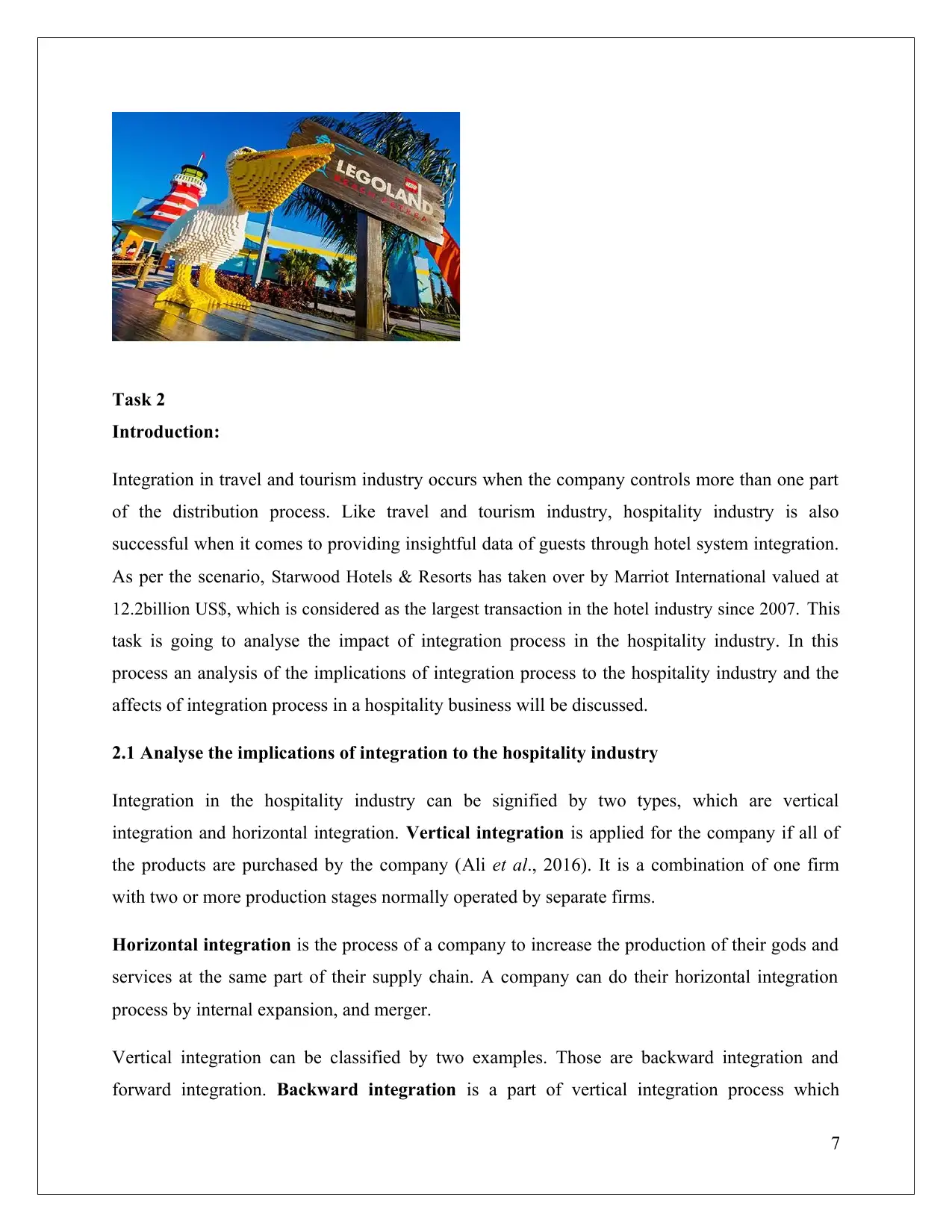
Task 2
Introduction:
Integration in travel and tourism industry occurs when the company controls more than one part
of the distribution process. Like travel and tourism industry, hospitality industry is also
successful when it comes to providing insightful data of guests through hotel system integration.
As per the scenario, Starwood Hotels & Resorts has taken over by Marriot International valued at
12.2billion US$, which is considered as the largest transaction in the hotel industry since 2007. This
task is going to analyse the impact of integration process in the hospitality industry. In this
process an analysis of the implications of integration process to the hospitality industry and the
affects of integration process in a hospitality business will be discussed.
2.1 Analyse the implications of integration to the hospitality industry
Integration in the hospitality industry can be signified by two types, which are vertical
integration and horizontal integration. Vertical integration is applied for the company if all of
the products are purchased by the company (Ali et al., 2016). It is a combination of one firm
with two or more production stages normally operated by separate firms.
Horizontal integration is the process of a company to increase the production of their gods and
services at the same part of their supply chain. A company can do their horizontal integration
process by internal expansion, and merger.
Vertical integration can be classified by two examples. Those are backward integration and
forward integration. Backward integration is a part of vertical integration process which
7
Introduction:
Integration in travel and tourism industry occurs when the company controls more than one part
of the distribution process. Like travel and tourism industry, hospitality industry is also
successful when it comes to providing insightful data of guests through hotel system integration.
As per the scenario, Starwood Hotels & Resorts has taken over by Marriot International valued at
12.2billion US$, which is considered as the largest transaction in the hotel industry since 2007. This
task is going to analyse the impact of integration process in the hospitality industry. In this
process an analysis of the implications of integration process to the hospitality industry and the
affects of integration process in a hospitality business will be discussed.
2.1 Analyse the implications of integration to the hospitality industry
Integration in the hospitality industry can be signified by two types, which are vertical
integration and horizontal integration. Vertical integration is applied for the company if all of
the products are purchased by the company (Ali et al., 2016). It is a combination of one firm
with two or more production stages normally operated by separate firms.
Horizontal integration is the process of a company to increase the production of their gods and
services at the same part of their supply chain. A company can do their horizontal integration
process by internal expansion, and merger.
Vertical integration can be classified by two examples. Those are backward integration and
forward integration. Backward integration is a part of vertical integration process which
7
Paraphrase This Document
Need a fresh take? Get an instant paraphrase of this document with our AI Paraphraser
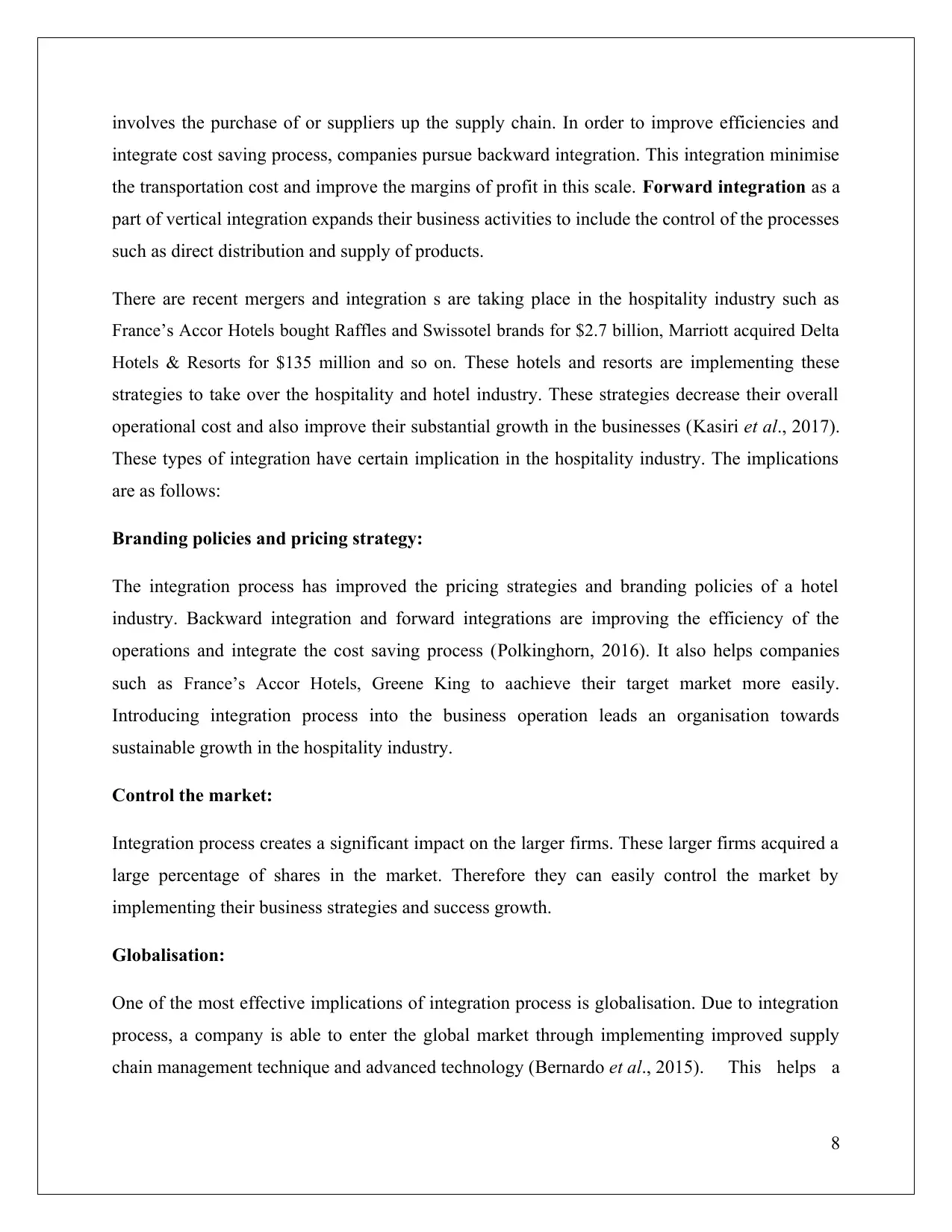
involves the purchase of or suppliers up the supply chain. In order to improve efficiencies and
integrate cost saving process, companies pursue backward integration. This integration minimise
the transportation cost and improve the margins of profit in this scale. Forward integration as a
part of vertical integration expands their business activities to include the control of the processes
such as direct distribution and supply of products.
There are recent mergers and integration s are taking place in the hospitality industry such as
France’s Accor Hotels bought Raffles and Swissotel brands for $2.7 billion, Marriott acquired Delta
Hotels & Resorts for $135 million and so on. These hotels and resorts are implementing these
strategies to take over the hospitality and hotel industry. These strategies decrease their overall
operational cost and also improve their substantial growth in the businesses (Kasiri et al., 2017).
These types of integration have certain implication in the hospitality industry. The implications
are as follows:
Branding policies and pricing strategy:
The integration process has improved the pricing strategies and branding policies of a hotel
industry. Backward integration and forward integrations are improving the efficiency of the
operations and integrate the cost saving process (Polkinghorn, 2016). It also helps companies
such as France’s Accor Hotels, Greene King to aachieve their target market more easily.
Introducing integration process into the business operation leads an organisation towards
sustainable growth in the hospitality industry.
Control the market:
Integration process creates a significant impact on the larger firms. These larger firms acquired a
large percentage of shares in the market. Therefore they can easily control the market by
implementing their business strategies and success growth.
Globalisation:
One of the most effective implications of integration process is globalisation. Due to integration
process, a company is able to enter the global market through implementing improved supply
chain management technique and advanced technology (Bernardo et al., 2015). This helps a
8
integrate cost saving process, companies pursue backward integration. This integration minimise
the transportation cost and improve the margins of profit in this scale. Forward integration as a
part of vertical integration expands their business activities to include the control of the processes
such as direct distribution and supply of products.
There are recent mergers and integration s are taking place in the hospitality industry such as
France’s Accor Hotels bought Raffles and Swissotel brands for $2.7 billion, Marriott acquired Delta
Hotels & Resorts for $135 million and so on. These hotels and resorts are implementing these
strategies to take over the hospitality and hotel industry. These strategies decrease their overall
operational cost and also improve their substantial growth in the businesses (Kasiri et al., 2017).
These types of integration have certain implication in the hospitality industry. The implications
are as follows:
Branding policies and pricing strategy:
The integration process has improved the pricing strategies and branding policies of a hotel
industry. Backward integration and forward integrations are improving the efficiency of the
operations and integrate the cost saving process (Polkinghorn, 2016). It also helps companies
such as France’s Accor Hotels, Greene King to aachieve their target market more easily.
Introducing integration process into the business operation leads an organisation towards
sustainable growth in the hospitality industry.
Control the market:
Integration process creates a significant impact on the larger firms. These larger firms acquired a
large percentage of shares in the market. Therefore they can easily control the market by
implementing their business strategies and success growth.
Globalisation:
One of the most effective implications of integration process is globalisation. Due to integration
process, a company is able to enter the global market through implementing improved supply
chain management technique and advanced technology (Bernardo et al., 2015). This helps a
8
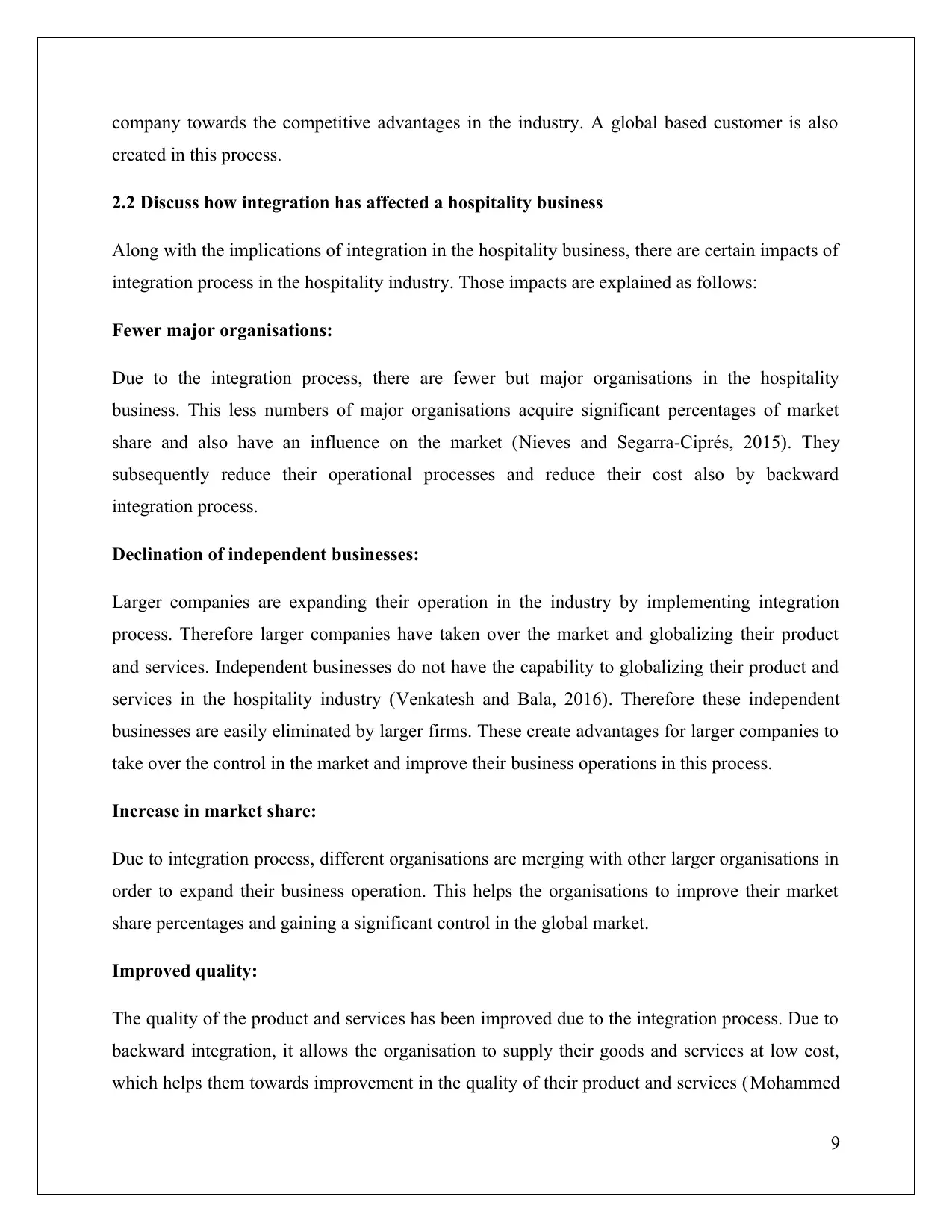
company towards the competitive advantages in the industry. A global based customer is also
created in this process.
2.2 Discuss how integration has affected a hospitality business
Along with the implications of integration in the hospitality business, there are certain impacts of
integration process in the hospitality industry. Those impacts are explained as follows:
Fewer major organisations:
Due to the integration process, there are fewer but major organisations in the hospitality
business. This less numbers of major organisations acquire significant percentages of market
share and also have an influence on the market (Nieves and Segarra-Ciprés, 2015). They
subsequently reduce their operational processes and reduce their cost also by backward
integration process.
Declination of independent businesses:
Larger companies are expanding their operation in the industry by implementing integration
process. Therefore larger companies have taken over the market and globalizing their product
and services. Independent businesses do not have the capability to globalizing their product and
services in the hospitality industry (Venkatesh and Bala, 2016). Therefore these independent
businesses are easily eliminated by larger firms. These create advantages for larger companies to
take over the control in the market and improve their business operations in this process.
Increase in market share:
Due to integration process, different organisations are merging with other larger organisations in
order to expand their business operation. This helps the organisations to improve their market
share percentages and gaining a significant control in the global market.
Improved quality:
The quality of the product and services has been improved due to the integration process. Due to
backward integration, it allows the organisation to supply their goods and services at low cost,
which helps them towards improvement in the quality of their product and services (Mohammed
9
created in this process.
2.2 Discuss how integration has affected a hospitality business
Along with the implications of integration in the hospitality business, there are certain impacts of
integration process in the hospitality industry. Those impacts are explained as follows:
Fewer major organisations:
Due to the integration process, there are fewer but major organisations in the hospitality
business. This less numbers of major organisations acquire significant percentages of market
share and also have an influence on the market (Nieves and Segarra-Ciprés, 2015). They
subsequently reduce their operational processes and reduce their cost also by backward
integration process.
Declination of independent businesses:
Larger companies are expanding their operation in the industry by implementing integration
process. Therefore larger companies have taken over the market and globalizing their product
and services. Independent businesses do not have the capability to globalizing their product and
services in the hospitality industry (Venkatesh and Bala, 2016). Therefore these independent
businesses are easily eliminated by larger firms. These create advantages for larger companies to
take over the control in the market and improve their business operations in this process.
Increase in market share:
Due to integration process, different organisations are merging with other larger organisations in
order to expand their business operation. This helps the organisations to improve their market
share percentages and gaining a significant control in the global market.
Improved quality:
The quality of the product and services has been improved due to the integration process. Due to
backward integration, it allows the organisation to supply their goods and services at low cost,
which helps them towards improvement in the quality of their product and services (Mohammed
9
⊘ This is a preview!⊘
Do you want full access?
Subscribe today to unlock all pages.

Trusted by 1+ million students worldwide
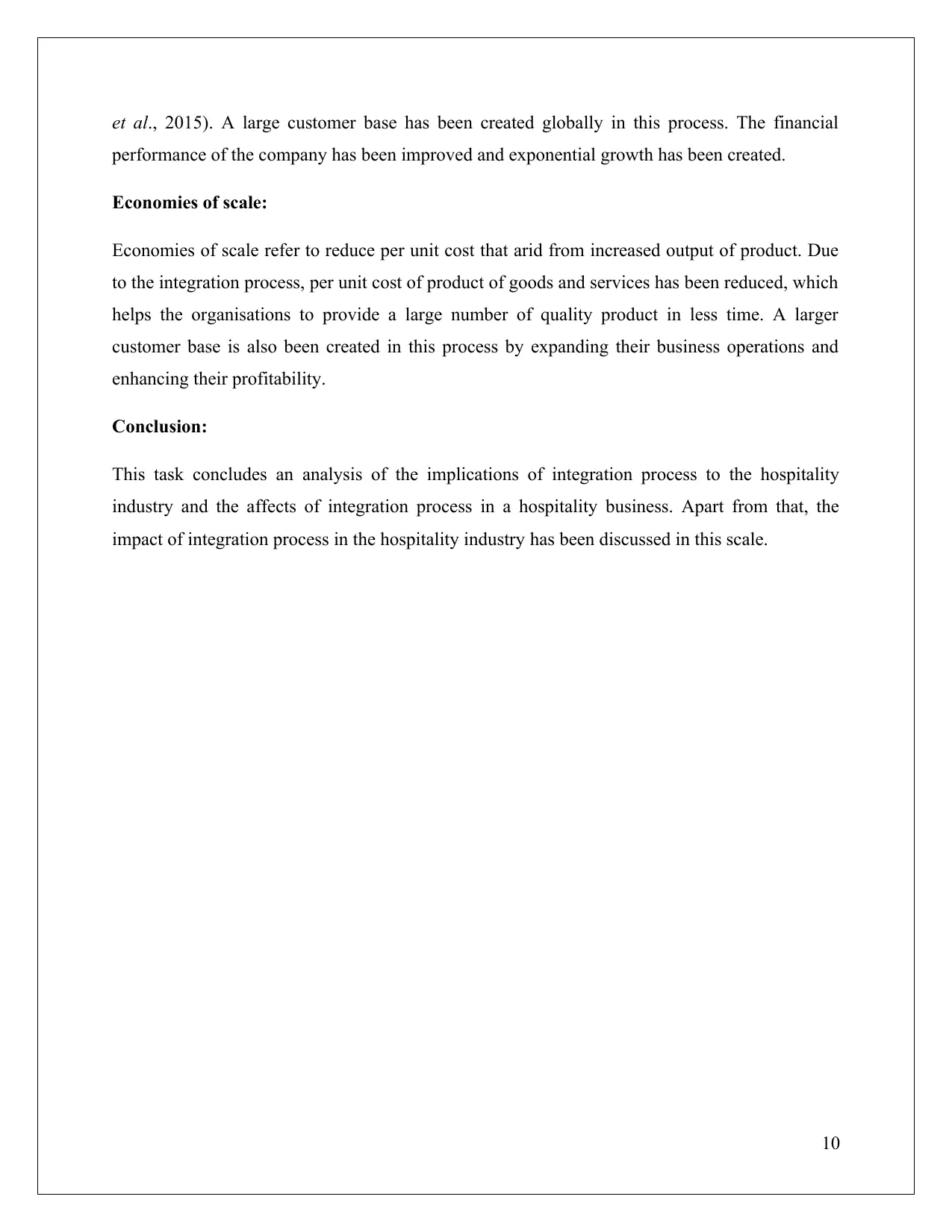
et al., 2015). A large customer base has been created globally in this process. The financial
performance of the company has been improved and exponential growth has been created.
Economies of scale:
Economies of scale refer to reduce per unit cost that arid from increased output of product. Due
to the integration process, per unit cost of product of goods and services has been reduced, which
helps the organisations to provide a large number of quality product in less time. A larger
customer base is also been created in this process by expanding their business operations and
enhancing their profitability.
Conclusion:
This task concludes an analysis of the implications of integration process to the hospitality
industry and the affects of integration process in a hospitality business. Apart from that, the
impact of integration process in the hospitality industry has been discussed in this scale.
10
performance of the company has been improved and exponential growth has been created.
Economies of scale:
Economies of scale refer to reduce per unit cost that arid from increased output of product. Due
to the integration process, per unit cost of product of goods and services has been reduced, which
helps the organisations to provide a large number of quality product in less time. A larger
customer base is also been created in this process by expanding their business operations and
enhancing their profitability.
Conclusion:
This task concludes an analysis of the implications of integration process to the hospitality
industry and the affects of integration process in a hospitality business. Apart from that, the
impact of integration process in the hospitality industry has been discussed in this scale.
10
Paraphrase This Document
Need a fresh take? Get an instant paraphrase of this document with our AI Paraphraser
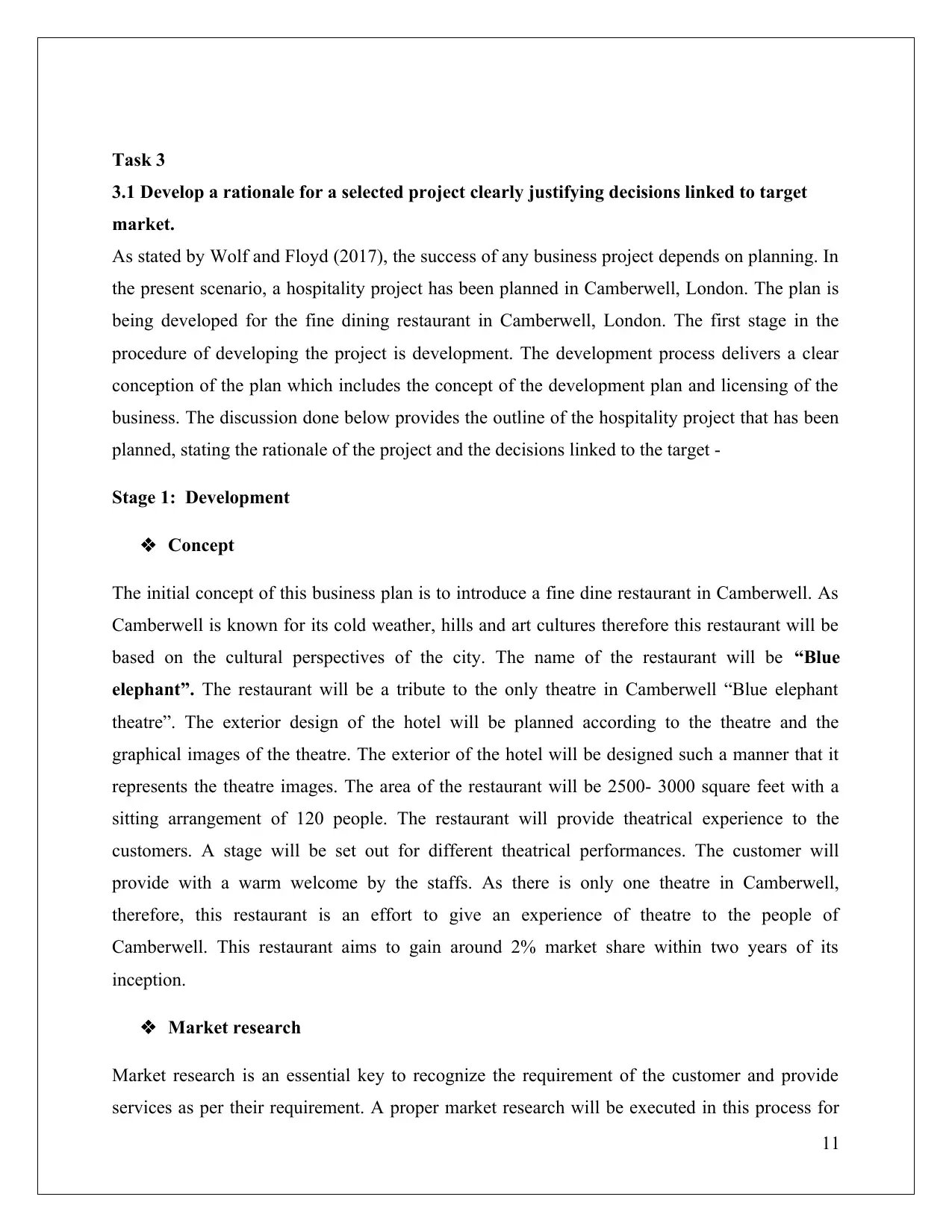
Task 3
3.1 Develop a rationale for a selected project clearly justifying decisions linked to target
market.
As stated by Wolf and Floyd (2017), the success of any business project depends on planning. In
the present scenario, a hospitality project has been planned in Camberwell, London. The plan is
being developed for the fine dining restaurant in Camberwell, London. The first stage in the
procedure of developing the project is development. The development process delivers a clear
conception of the plan which includes the concept of the development plan and licensing of the
business. The discussion done below provides the outline of the hospitality project that has been
planned, stating the rationale of the project and the decisions linked to the target -
Stage 1: Development
Concept
The initial concept of this business plan is to introduce a fine dine restaurant in Camberwell. As
Camberwell is known for its cold weather, hills and art cultures therefore this restaurant will be
based on the cultural perspectives of the city. The name of the restaurant will be “Blue
elephant”. The restaurant will be a tribute to the only theatre in Camberwell “Blue elephant
theatre”. The exterior design of the hotel will be planned according to the theatre and the
graphical images of the theatre. The exterior of the hotel will be designed such a manner that it
represents the theatre images. The area of the restaurant will be 2500- 3000 square feet with a
sitting arrangement of 120 people. The restaurant will provide theatrical experience to the
customers. A stage will be set out for different theatrical performances. The customer will
provide with a warm welcome by the staffs. As there is only one theatre in Camberwell,
therefore, this restaurant is an effort to give an experience of theatre to the people of
Camberwell. This restaurant aims to gain around 2% market share within two years of its
inception.
Market research
Market research is an essential key to recognize the requirement of the customer and provide
services as per their requirement. A proper market research will be executed in this process for
11
3.1 Develop a rationale for a selected project clearly justifying decisions linked to target
market.
As stated by Wolf and Floyd (2017), the success of any business project depends on planning. In
the present scenario, a hospitality project has been planned in Camberwell, London. The plan is
being developed for the fine dining restaurant in Camberwell, London. The first stage in the
procedure of developing the project is development. The development process delivers a clear
conception of the plan which includes the concept of the development plan and licensing of the
business. The discussion done below provides the outline of the hospitality project that has been
planned, stating the rationale of the project and the decisions linked to the target -
Stage 1: Development
Concept
The initial concept of this business plan is to introduce a fine dine restaurant in Camberwell. As
Camberwell is known for its cold weather, hills and art cultures therefore this restaurant will be
based on the cultural perspectives of the city. The name of the restaurant will be “Blue
elephant”. The restaurant will be a tribute to the only theatre in Camberwell “Blue elephant
theatre”. The exterior design of the hotel will be planned according to the theatre and the
graphical images of the theatre. The exterior of the hotel will be designed such a manner that it
represents the theatre images. The area of the restaurant will be 2500- 3000 square feet with a
sitting arrangement of 120 people. The restaurant will provide theatrical experience to the
customers. A stage will be set out for different theatrical performances. The customer will
provide with a warm welcome by the staffs. As there is only one theatre in Camberwell,
therefore, this restaurant is an effort to give an experience of theatre to the people of
Camberwell. This restaurant aims to gain around 2% market share within two years of its
inception.
Market research
Market research is an essential key to recognize the requirement of the customer and provide
services as per their requirement. A proper market research will be executed in this process for
11
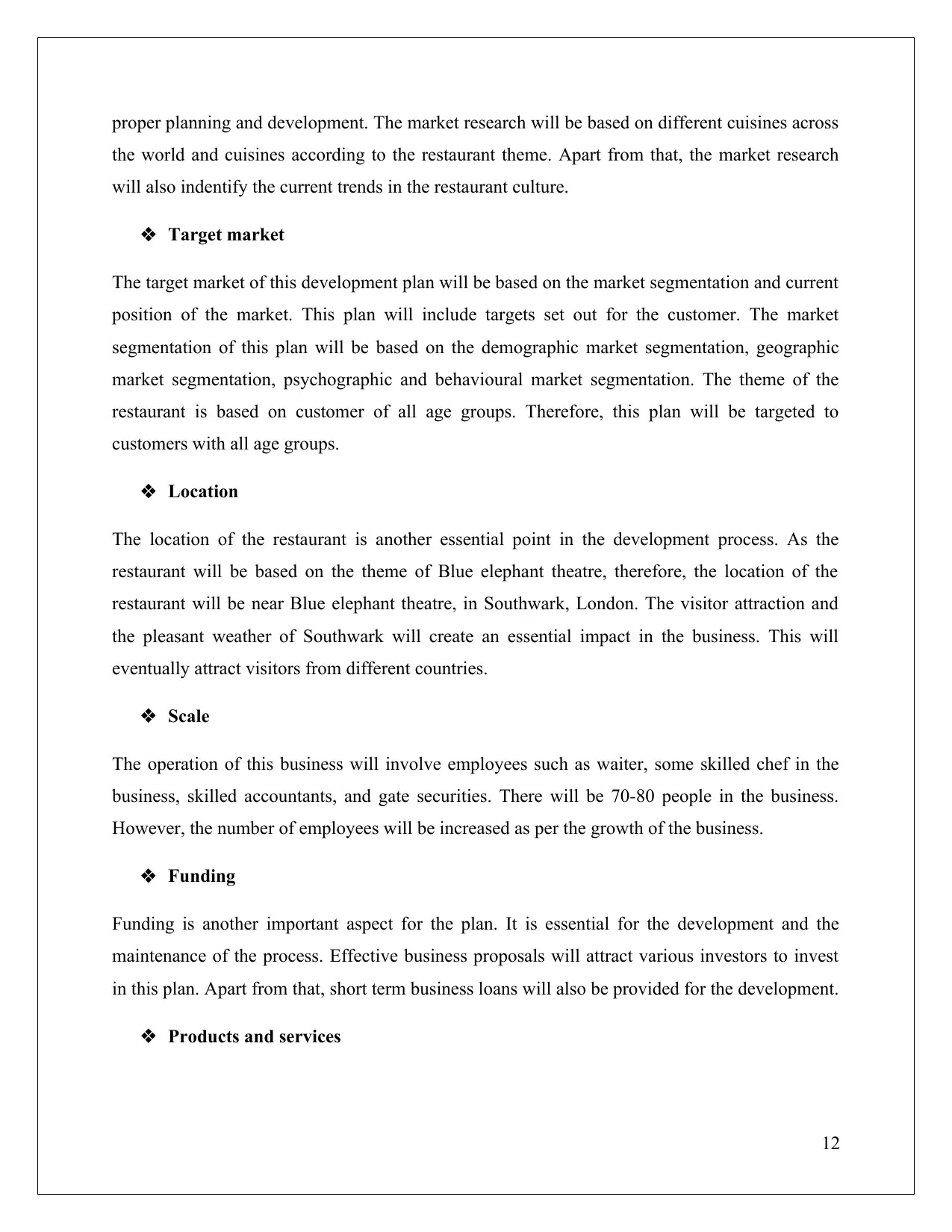
proper planning and development. The market research will be based on different cuisines across
the world and cuisines according to the restaurant theme. Apart from that, the market research
will also indentify the current trends in the restaurant culture.
Target market
The target market of this development plan will be based on the market segmentation and current
position of the market. This plan will include targets set out for the customer. The market
segmentation of this plan will be based on the demographic market segmentation, geographic
market segmentation, psychographic and behavioural market segmentation. The theme of the
restaurant is based on customer of all age groups. Therefore, this plan will be targeted to
customers with all age groups.
Location
The location of the restaurant is another essential point in the development process. As the
restaurant will be based on the theme of Blue elephant theatre, therefore, the location of the
restaurant will be near Blue elephant theatre, in Southwark, London. The visitor attraction and
the pleasant weather of Southwark will create an essential impact in the business. This will
eventually attract visitors from different countries.
Scale
The operation of this business will involve employees such as waiter, some skilled chef in the
business, skilled accountants, and gate securities. There will be 70-80 people in the business.
However, the number of employees will be increased as per the growth of the business.
Funding
Funding is another important aspect for the plan. It is essential for the development and the
maintenance of the process. Effective business proposals will attract various investors to invest
in this plan. Apart from that, short term business loans will also be provided for the development.
Products and services
12
the world and cuisines according to the restaurant theme. Apart from that, the market research
will also indentify the current trends in the restaurant culture.
Target market
The target market of this development plan will be based on the market segmentation and current
position of the market. This plan will include targets set out for the customer. The market
segmentation of this plan will be based on the demographic market segmentation, geographic
market segmentation, psychographic and behavioural market segmentation. The theme of the
restaurant is based on customer of all age groups. Therefore, this plan will be targeted to
customers with all age groups.
Location
The location of the restaurant is another essential point in the development process. As the
restaurant will be based on the theme of Blue elephant theatre, therefore, the location of the
restaurant will be near Blue elephant theatre, in Southwark, London. The visitor attraction and
the pleasant weather of Southwark will create an essential impact in the business. This will
eventually attract visitors from different countries.
Scale
The operation of this business will involve employees such as waiter, some skilled chef in the
business, skilled accountants, and gate securities. There will be 70-80 people in the business.
However, the number of employees will be increased as per the growth of the business.
Funding
Funding is another important aspect for the plan. It is essential for the development and the
maintenance of the process. Effective business proposals will attract various investors to invest
in this plan. Apart from that, short term business loans will also be provided for the development.
Products and services
12
⊘ This is a preview!⊘
Do you want full access?
Subscribe today to unlock all pages.

Trusted by 1+ million students worldwide
1 out of 19
Related Documents
Your All-in-One AI-Powered Toolkit for Academic Success.
+13062052269
info@desklib.com
Available 24*7 on WhatsApp / Email
![[object Object]](/_next/static/media/star-bottom.7253800d.svg)
Unlock your academic potential
Copyright © 2020–2026 A2Z Services. All Rights Reserved. Developed and managed by ZUCOL.




